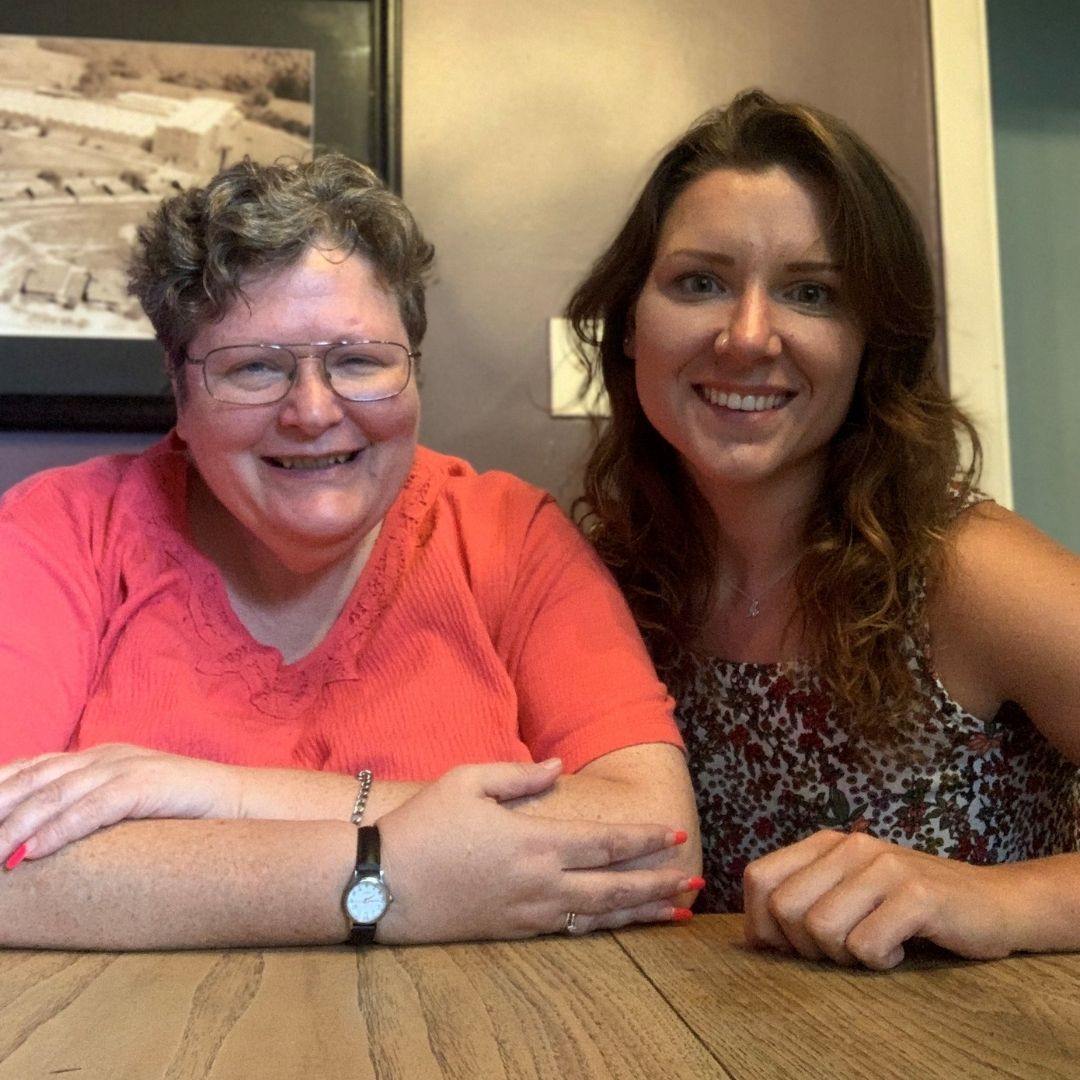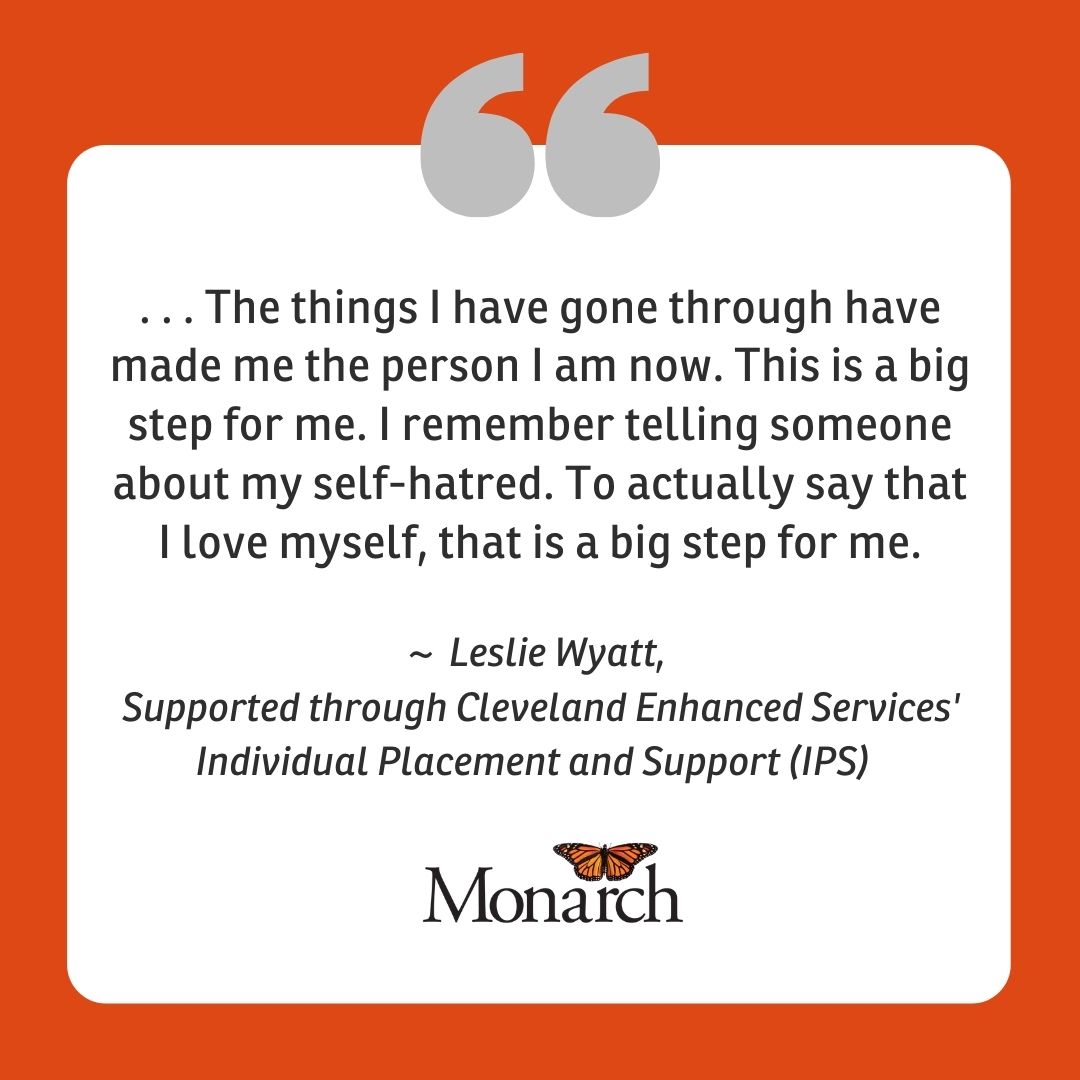Healing to Help Others: Cleveland IPS Team Supports Therapist’s Return

Kayla Keerl, right, Employment Support Professional with the Cleveland IPS staff and a strong support, meets with Leslie Wyatt, who is reaching her employment goals with the team’s assistance.
Working as a licensed mental health therapist, Leslie Wyatt lost herself, both personally and professionally, in helping others to heal.
Today, she is successfully navigating her way back to fulfilling her career dream of working as a licensed therapist again with the help of the Enhanced Services’ Cleveland Individual Placement and Support (IPS) team. Monarch’s IPS service is a person-centered, behavioral health service with a focus on choosing, acquiring and maintaining employment within the community. In simple terms, IPS staff serve as a reliable network of support for an individual diagnosed with mental health issues while pursuing employment goals.
First licensed as a therapist in 2011, it was in 2015 that years of ignoring her own mental health struggles caught up with Wyatt. At the time, it was determined that she was not delivering the kind of therapy that her clients needed. The State of North Carolina suspended her therapist’s license.
Over and over, she had guided others to an opportunity of healing. She needed to extend the same opportunity for healing to herself.
That began with seeking therapy through the Phoenix Counseling Center. She was diagnosed with bipolar disorder, post-traumatic stress disorder (PTSD) and dis-associative behaviors, which is a disconnection between thoughts, memories, surroundings, actions and identity.
Phoenix referred Wyatt, 58, for employment support through Monarch’s IPS services in Cleveland County. The IPS team, which includes Employment Support Professional Kayla Keerl, QP, and Employment Peer Mentor Paul Phillips, provided coping skills, identified mental health triggers, located community assistance resources, managed medication in addition to helping Wyatt create a plan to reach her employment goals.
She had worked in a variety of jobs such as retail merchandiser and substitute teacher but none were as fulfilling as helping others in the mental health field. The IPS team suggested the role of peer support specialist (PSS), a person with “lived experience” trained to support people who struggle with mental health, psychological trauma or substance use.
Wyatt took the peer support specialist (PSS) course through Vocational Rehabilitation Services and earned her certificate. She currently facilitates two National Association of Mental Illness (NAMI) support groups, serves on their Board of Directors and employed as a PSS through Coastal Southeastern United Care in Gastonia. Sober for over 31 years, Wyatt also returned in 2018 to active involvement in Alcoholics Anonymous as a participant and facilitator.
 As a PSS, she has unique opportunities to offer personal insight from her mental health journey: “Being a PSS gives me the opportunity to share my own story. A lot of times you don’t get that as a therapist because it is not part of what you share with your clients. As a PSS, I can say I have been through similar situations while sharing my experiences, strength and hope.”
As a PSS, she has unique opportunities to offer personal insight from her mental health journey: “Being a PSS gives me the opportunity to share my own story. A lot of times you don’t get that as a therapist because it is not part of what you share with your clients. As a PSS, I can say I have been through similar situations while sharing my experiences, strength and hope.”
Wyatt sees a silver lining in losing her therapist’s license. “Having boundaries is a top priority . . . Allowing myself to be human. I have a very big perfectionist streak. I once told a therapist that the rules don’t apply to me. I will cut other people a break but not myself,” she shared insightfully.
Keerl is helping Wyatt through the detailed process of applying for her therapist’s license re-instatement through the North Carolina Board of Licensed Clinical Mental Health Counselors. Keerl and Phillips help her focus on breaking down the process instead of becoming overwhelmed or when negative self-talk creeps in.
Keerl and Wyatt talk through other mental health focused roles besides therapist that might be options should her license re-instatement be declined. “She has made so much progress in such a short time and she is strong enough to handle if a worse-case scenario happens,” Keerl shared, adding that Wyatt could pursue work as a qualified mental health professional or continue as a PSS.
Hindsight is often 20/20 so is there anything Wyatt would change if she had a second chance? “I wouldn’t change anything. The things I have gone through have made me the person I am now. This is a big step for me. I remember telling someone about my self-hatred. To actually say that I love myself, that is a big step for me,” she confided.
For more information or if you or someone you know needs IPS services, please call (866) 272-7826 or visit here to find out more about Monarch’s behavioral health outpatient services.
Other Monarch stories on peer support specialists:
• Peer Support Specialist Amin Norris Offers Hope to Others in Similar Situation
• Peer Bridger Smooths Transition After Hospital Stay, Connects to Resources
Posted on: Thursday July 22, 2021
